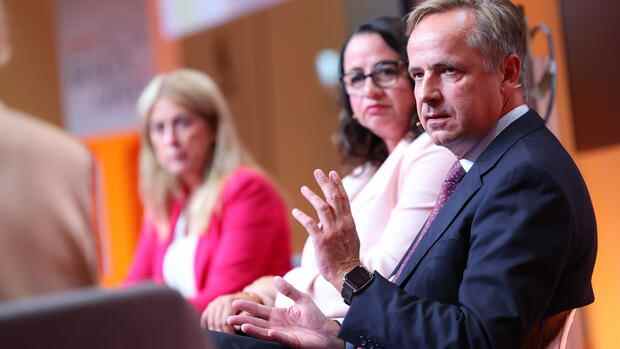Banks need to develop their business models more urgently than ever in the coming years – especially with a view to sustainability, emphasized Thomas Steiner from management consultant Bearing Point on Wednesday at the Handelsblatt banking summit. Maria Ferraro, Chief Financial Officer at Siemens Energy, posited: “We all have a responsibility. The time is now.”
And the banks themselves? They agreed entirely with this tenor. According to Stefan Hanke, head of Germany at Citigroup, one must act more flexibly in view of the current energy crisis than was thought last year. “The war in Ukraine has called many assumptions into question with regard to ESG.” These days, the “S” in “ESG” should no longer only stand for social aspects, but also has to represent security – especially with regard to the energy supply.
Nevertheless, Barclays Germany boss Ingrid Hengster says: The direction in which the industry is moving is “clear and will not change anymore”.
Top jobs of the day
Find the best jobs now and
be notified by email.
The climate aspect in particular plays a major role for banks when it comes to ESG. Because both internally and externally, there are great expectations of contributing to the green transformation of the economy. Hengster said: “We want to help our customers to create the green transformation.”
banks as intermediaries
The financial institutions see themselves in the role of, as Stefan Hanke put it, “mediators” between business, consumers and politics. And also out of self-interest: According to a study by Landesbank Baden-Württemberg (LBBW), companies that operate sustainably are more successful in the long term. “The pendulum has swung,” confirmed Ferraro. More and more investors would no longer think only of short-term return opportunities.
Only: Which criteria should this intermediary role of the financial institutions be based on? There is still a great deal of disagreement about this. This was recently shown, for example, by the discussions about the new EU taxonomy, according to which gas and nuclear power are also considered sustainable investments.
And that also shows the great distrust in ESG ratings in general: According to a survey by the EU Commission, 84 percent of those questioned question the functionality of the ESG rating market in its current form.
Also because one and the same company can be classified as sustainable by one rating agency – and anything but that by the next. Because the ratings are each based on specific focal points and criteria: For example, CDP Climate Change focuses on climate issues, while ISS ESG tries to map the entire sustainability spectrum.
>>> Also read: Bank bosses fear inflation and crises – and disagree on the ECB monetary policy
Marlen Lawrenz works for the banking software company nCino. She says: “Banks and customers alike are looking for answers to the question of how ESG can be operationalized.” The amount of data that theoretically exists about a company “to bring together and make digestible” is “an insane challenge for banks “.
She therefore proposes initially concentrating on just one ESG goal, such as climate protection, in an interim phase. The two criteria social and corporate governance are difficult to measure or even define, she says. CO2 data, on the other hand, are measurable and transparent. “In order to act quickly, it might make sense to commit to this one topic.” However, the other aspects of ESG should not be neglected in the long term.
This is how the Handelsblatt reports on the 2022 banking summit:
According to Maria Ferraro, the criteria of environment, social issues and corporate governance are inextricably linked. Anyone who only concentrates on the environment is on the wrong track in the long term. “The competition for the future is also a competition for talent,” said Ferraro. Social aspects such as diversity will therefore be at least as important a competitive advantage in the business world in the future.
Nevertheless: “I don’t think we have the luxury of setting our own priorities,” said Hanke. These days, more than ever, it’s about the “S” in ESG – albeit in the sense of security. And climate change is unmistakable and urgently needs to be slowed down.
“The financial need in the environmental sector alone is so great that we need all the financial resources we can get,” added Hengster. Germany and Europe now need “as many small start-ups in this area as possible so that we have one or two big technological pioneers in the future”.
At the same time, the financial institutions would also have to support private households in switching to sustainable energy. One tool Hengster proposes is cheaper mortgages for houses with clean energy sources.
More: Deutsche Bank boss Sewing: “We have to make ourselves more independent”
